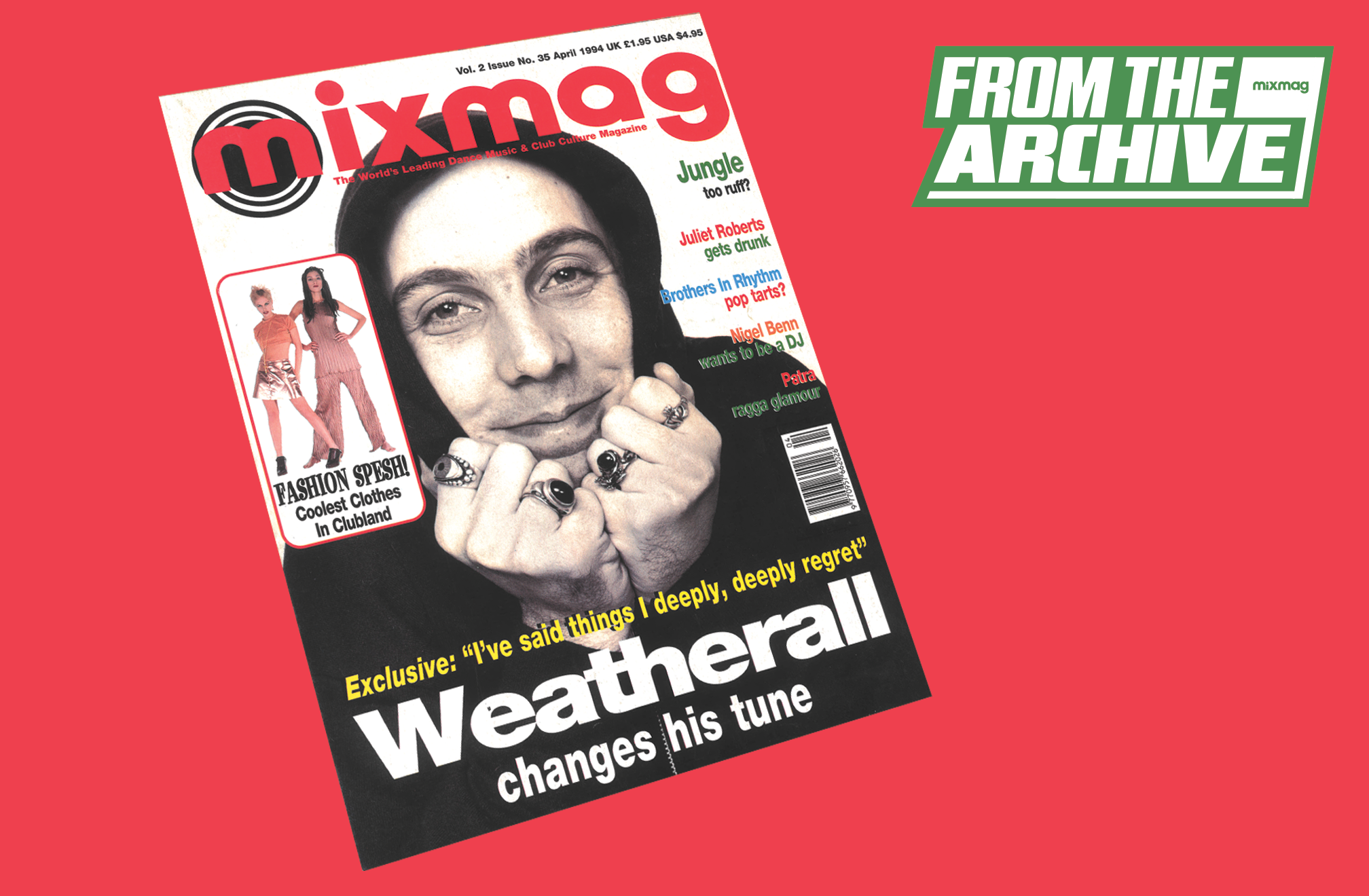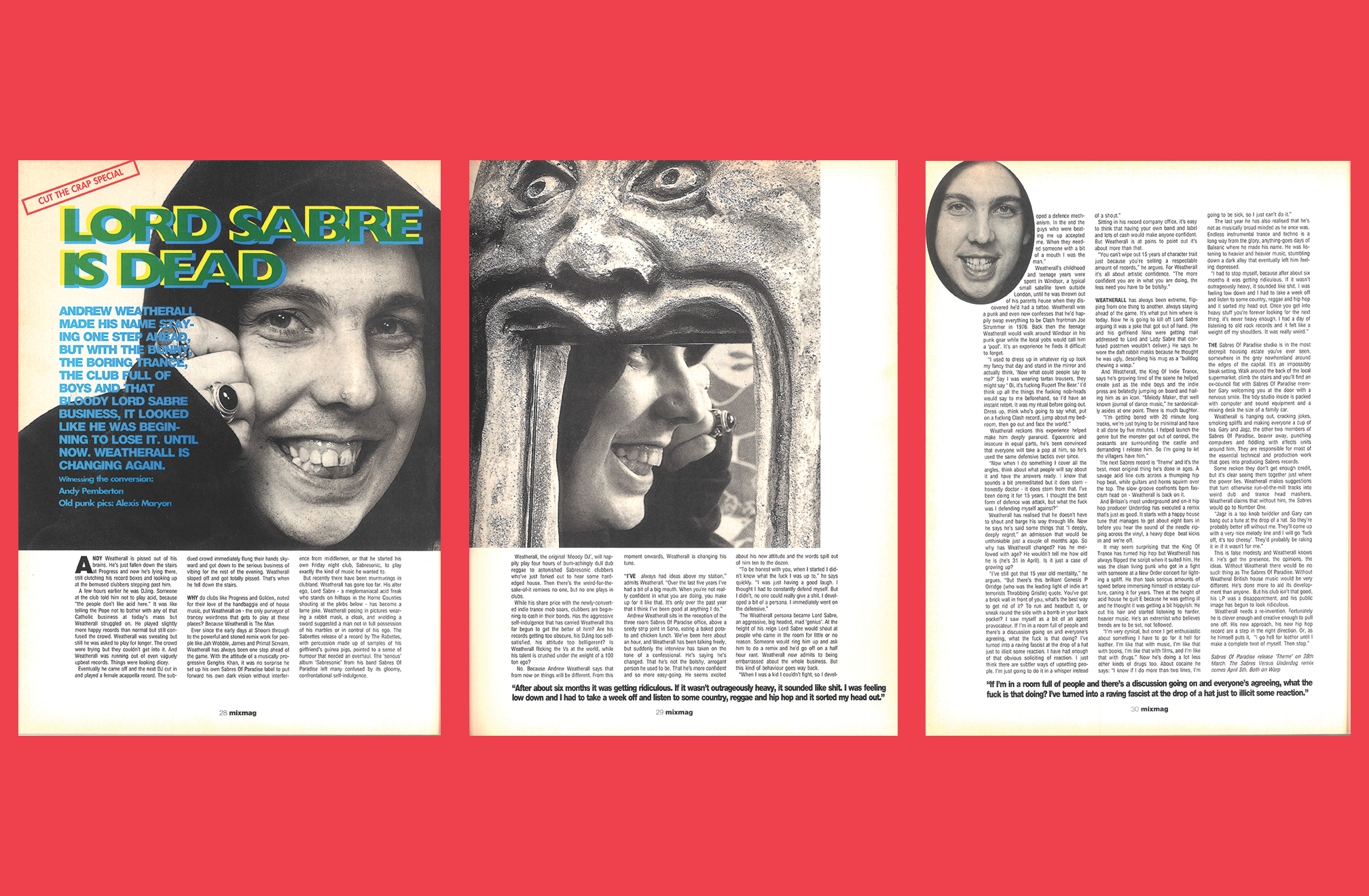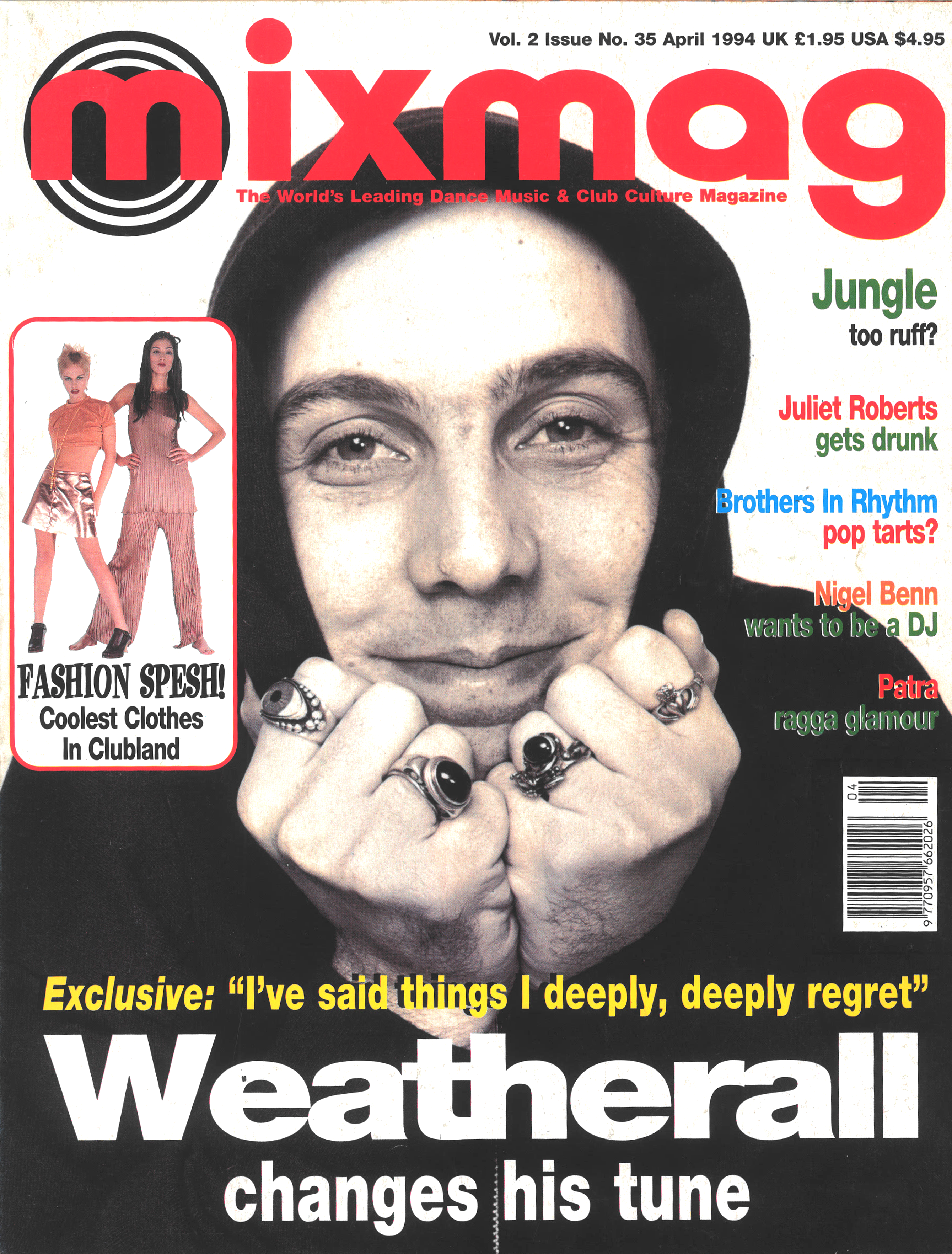 Features
Features
From the archive: Andrew Weatherall changes his tune
Andrew Weatherall was an extremist who believed trends are to be set, not followed. For Mixmag’s April 1994 cover feature, Andy Pemberton met the British maverick at a pivotal moment in his career — his club night was confusing, his latest album disappointing, and his public image had become ludicrous. In a therapeutic discussion, he revealed his plans for reinvention
Andy Weatherall is pissed out of his brains. He’s just fallen down the stairs at Progress and now he’s lying there, still clutching his record boxes and looking up at the bemused clubbers stepping past him.
A few hours earlier he was DJing. Someone at the club told him not to play acid, because “the people don’t like acid here.” It was like telling the Pope not to bother with any of that Catholic business at today’s mass but Weatherall struggled on. He played slightly more happy records than normal but still confused the crowd. Weatherall was sweating but still, he was asked to play for longer. The crowd were trying but they couldn’t get into it. And Weatherall was running out of even vaguely upbeat records. Things were looking dicey.
Eventually, he came off and the next DJ cut in and played a female acapella record. The subdued crowd immediately flung their hands skyward and got down to the serious business of vibing for the rest of the evening. Weatherall sloped off and got totally pissed. That’s when he fell down the stairs.
Why do clubs like Progress and Golden, noted for their love of the handbaggie end of house music, put Weatherall on - the only purveyor of trancey weirdness that gets to play at these places? Because Weatherall is The Man.
Ever since the early days at Shoom through to the powerful and stoned remix work for people like Jah Wobble, James and Primal Scream, Weatherall has always been one step ahead of the game. With the attitude of a musically progressive Genghis Khan, it was no surprise he set up his own Sabres Of Paradise label to put forward his own dark vision without interference from middlemen, or that he started his own Friday night club, Sabresonic, to play exactly the kind of music he wanted to.
But recently there have been murmurings in clubland. Weatherall has gone too far. His alter ego, Lord Sabre - a megalomaniacal acid freak who stands on hilltops in the Home Counties shouting at the plebs below - has become a lame joke. Weatherall posing in pictures wearing a rabbit mask, a cloak, and wielding a sword suggested a man not in full possession of his marbles or in control of his ego. The Sabrettes release of a record by The Rabettes, with percussion made up of samples of his girlfriend's guinea pigs, pointed to a sense of humour that needed an overhaul. The ‘serious’ album ‘Sabresonic’ from his band Sabres Of Paradise left many confused by its gloomy, confrontational self-indulgence.

Weatherall, the original ‘Moody Du’, will happily play four hours of bum-achingly dull dub reggae to astonished Sabresonic clubbers who've just forked out to hear some hard-edged house. Then there’s the weird-for-the-sake-of-it remixes no one, but no one plays in clubs.
While his share price with the newly converted indie trance mob soars, clubbers are beginning to cash in their bonds. Has the aggressive self-indulgence that has carried Weatherall this far begun to get the better of him? Are his records getting too obscure, his DJing too self-satisfied, his attitude too belligerent? Is Weatherall flicking the Vs at the world, while his talent is crushed under the weight of a 100 ton ego?
No. Because Andrew Weatherall says that from now on things will be different. From this moment onwards, Weatherall is changing his tune.
“After about six months it was getting ridiculous. If it wasn’t outrageously heavy, it sounded like shit. I was feeling low down and I had to take a week off and listen to some country, reggae and hip hop and it sorted my head out.”
“I’ve always had ideas above my station,” admits Weatherall. “Over the last five years I’ve had a bit of a big mouth. When you're not really confident in what you are doing, you make up for it like that. It's only over the past year that I think I've been good at anything I do.”

Andrew Weatherall sits in the reception of the three room Sabres Of Paradise office, above a seedy strip joint in Soho, eating a baked potato and chicken lunch. We've been here about an hour, and Weatherall has been talking freely, but suddenly the interview has taken on the tone of a confessional. He’s saying he’s changed. That-he’s not the bolshy, arrogant person he used to be. That he’s more confident and so more easy-going. He seems excited about his new attitude and the words spill out of him ten to the dozen.
“To be honest with you, when I started I didn't know what the fuck I was up to,” he says quickly. “I was just having a good laugh. I thought I had to constantly defend myself. But I didn’t, no one could really give a shit. I developed a bit of a persona. I immediately went on the defensive.”
The Weatherall persona became Lord Sabre, an aggressive, big headed, mad ‘genius’. At the height of his reign Lord Sabre would shout at people who came in the room for little or no reason. Someone would ring him up and ask him to do a remix and he'd go off on a half hour rant. Weatherall now admits to being embarrassed about the whole business. But this kind of behaviour goes way back.
“When I was a kid I couldn’t fight, so I developed a defence mechanism. In the end the guys who were beating me up accepted me. When they needed someone with a bit of a mouth I was the man.”
Weatherall’s childhood and teenage years were spent in Windsor, a typical small satellite town outside London, until he was thrown out of his parents house when they discovered he’d had a tattoo. Weatherall was a punk and even now confesses that he'd happily swap everything to be Clash frontman Joe Strummer in 1976. Back then the teenage Weatherall would walk around Windsor in his punk gear while the local yobs would call him a ‘poof’. It’s an experience he finds it difficult to forget.
“I used to dress up in whatever rig up took my fancy that day and stand in the mirror and actually think, ‘Now what could people say to me?’ Say I was wearing tartan trousers, they might say ‘ Oi, it’s fucking Rupert The Bear.’ I'd think up all the things the fucking nob-heads would say to me beforehand, so I'd have an instant retort. It was my ritual before going out. Dress up, think who's going to say what, put on a fucking Clash record, jump about my bedroom, then go out and face the world.”

Weatherall reckons this experience helped make him deeply paranoid. Egocentric and insecure in equal parts, he’s been convinced that everyone will take a pop at him, so he’s used the same defensive tactics ever since.
“Now when I do something I cover all the angles, think about what people will say about it and have the answers ready. I know that sounds a bit premeditated but it does stem - honestly doctor - it does stem from that. I've been doing it for 15 years. I thought the best form of defence was attack, but what the fuck was I defending myself against?”
Weatherall has realised that he doesn’t have to shout and barge his way through life. Now he says he's said some things that “I deeply, deeply regret,” an admission that would be unthinkable just a couple of months ago. So why has Weatherall changed? Has he mellowed with age? He wouldn't tell me how old he is (he’s 31 in April). Is it just a case of growing up?
“I've still got that 15 year old mentality,” he argues. “But there's this brilliant Genesis P-Orridge (who was the leading light of indie art terrorists Throbbing Gristle) quote. You've got 4 brick wall in front of you, what's the best way to get rid of it? To run and headbutt it, or sneak round the side with a bomb in your back pocket? I saw myself as a bit of an agent provocateur. If I’m in a room full of people and there's a discussion going on and everyone's agreeing, what the fuck is that doing? I’ve turned into a raving fascist at the drop of a hat just to illicit some reaction. I have had enough of that obvious soliciting of reaction. I just think there are subtler ways of upsetting people. I’m just going to do it in a whisper instead of a shout.”
Sitting in his record company office, it's easy to think that having your own band and label and lots of cash would make anyone confident. But Weatherall is at pains to point out it's about more than that.
“You can’t wipe out 15 years of character trait just because you're selling a respectable amount of records,” he argues. For Weatherall, it's all about artistic confidence. “The more confident you are in what you are doing, the less need you have to be bolshy.”

Weatherall has always been extreme, flipping from one thing to another, always staying ahead of the game. It's what put him where is today. Now he is going to kill off Lord Sabre arguing it was a joke that got out of hand. (He and his girlfriend Nina were getting mail addressed to Lord and Lady Sabre that confused postmen wouldn't deliver.) He says he wore the daft rabbit masks because he thought he was ugly, describing his mug as a “bulldog chewing a wasp.”
And Weatherall, the King Of Indie Trance, says he’s growing tired of the scene he helped create just as the indie boys and the indie press are belatedly jumping on board and hailing him as an icon. “Melody Maker, that well-known journal of dance music,” he sardonically asides at one point. There is much laughter.
“I’m getting bored with 20-minute-long tracks, we're just trying to be minimal and have it all done by five minutes. I helped launch the genre but the monster got out of control, the peasants are surrounding the castle and demanding I release him. So I’m going to let the villagers have him.”
The next Sabres record is ‘Theme’ and it’s the best, most original thing he’s done in ages. A savage acid line cuts across a thumping hip hop beat, while guitars and horns squirm over the top. The slow groove confronts BPM fascism head on - Weatherall is back on it.
And Britain’s most underground and on-it hip hop producer Underdog has executed a remix that’s just as good. It starts with a happy house tune that manages to get about eight bars in before you hear the sound of the needle ripping across the vinyl, a heavy dope beat kicks in and we're off.
It may seem surprising that the King Of Trance has turned hip hop but Weatherall has always flipped the script when it suited him. He was the clean-living punk who got in a fight with someone at a New Order concert for lighting a spliff. He then took serious amounts of speed before immersing himself in ecstasy culture, caning it for years. Then at the height of acid house he quit E because he was getting ill and he thought it was getting a bit hippyish. He cut his hair and started listening to harder, heavier music. He’s an extremist who believes trends are to be set, not followed.
“I'm very cynical, but once I get enthusiastic about something I have to go for it hell for leather. I'm like that with music, I’m like that with books, I’m like that with films, and I'm like that with drugs.” Now he’s doing a lot less other kinds of drugs too. About cocaine, he says: “I know if I do more than two lines, I'm going to be sick, so I just can't do it.”

The last year he has also realised that he’s not as musically broad-minded as he once was. Endless instrumental trance and techno is a long way from the glory, anything-goes days of Balearic where he made his name. He was listening to heavier and heavier music, stumbling down a dark alley that eventually left him feeling depressed.
“I had to stop myself because after about six months it was getting ridiculous. If it wasn’t outrageously heavy, it sounded like shit. I was feeling low down and I had to take a week off and listen to some country, reggae and hip hop and it sorted my head out. Once you get into heavy stuff you're forever looking for the next thing, it’s never heavy enough. | had a day of listening to old rock records and it felt like a weight off my shoulders. It was really weird.”
The Sabres Of Paradise studio is in the most decrepit housing estate you've ever seen, somewhere in the grey nowhereland around the edges of the capital. It's an impossibly bleak setting. Walk around the back of the local supermarket, climb the stairs and you'll find an ex-council flat with Sabres Of Paradise member Gary welcoming you at the door with a nervous smile. The tidy studio inside is packed with computer and sound equipment and a mixing desk the size of a family car.
Weatherall is hanging out, cracking jokes, smoking spliffs and making everyone a cup of tea. Gary and Jagz, the other two members of Sabres Of Paradise, beaver away, punching computers and fiddling with effects units around him. They are responsible for most of the essential technical and production work that goes into producing Sabres records.
Some reckon they don't get enough credit, but it’s clear seeing them together just where the power lies. Weatherall makes suggestions that turn otherwise run-of-the-mill tracks into weird dub and trance head mashers. Weatherall claims that without him, the Sabres would go to Number One.
“Jagz is a top knob twiddler and Gary can bang out a tune at the drop of a hat. So they're probably better off without me. They'll come up with a very nice melody line and I will go ‘fuck off, it's too cheesy’. They'd probably be raking it in if it wasn’t for me.”
This is false modesty and Weatherall knows it. He's got the presence, the opinions, the ideas. Without Weatherall there would be no such thing as The Sabres Of Paradise. Without Weatherall British house music would be very different. He’s done more to aid its development than anyone. But his club isn’t that good, his LP was a disappointment, and his public image has begun to look ridiculous.
Weatherall needs a re-invention. Fortunately he is clever enough and creative enough to pull one off. His new approach, his new hip hop record are a step in the right direction. Or, as he himself puts it, “I go hell for leather until I make a complete twat of myself. Then stop.”
This feature was taken from the April 1994 issue of Mixmag


